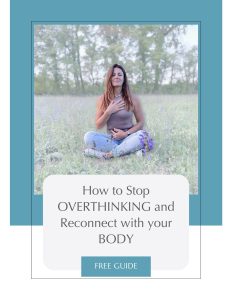What is Overthinking?
Thinking is a normal human behaviour. We all think thousands of thoughts during our day. The issue arises when we start to overthink.
Overthinking is the act of excessively contemplating or analysing a particular subject or situation for extended periods. This intense focus on a single topic makes it challenging to concentrate on anything else, as your mind becomes engrossed in the subject of your overthinking. It is when we become our thoughts. If you think about a tree, it does not mean that you are a tree.
Overthinking is a natural response to lack of safety.

How to Stop OVERTHINKING and Reconnect with your BODY
Download the Free PDF guide and..
Upon submitting your details you confirm acceptance of our *Privacy policy
Is Overthinking keeping you Stuck
Overthinking can indeed keep you stuck, hindering your ability to make decisions and progress.
It often manifests as a constant stream of thoughts, clouding your judgment and preventing new ideas from emerging due to the noise in your mind.
This is often a result of trying to predict the future and worrying about past events, leading to a cycle of doubt and frustration.
Overthinking can paralyze you, making it difficult to move forward.
To combat this, it’s important to use practices that can help you to move out of the thinking mind and be present within the body.
What causes overthinking?
Overthinking, is often triggered by personality traits like perfectionism and neuroticism, as well as by stressful life events and societal pressures, can be a symptom of depression, anxiety, panic disorders, and PTSD.
According to a study by the American Psychological Association (APA), approximately 73% of adults in the United States report overthinking about various aspects of their lives, from work to relationships.
This highlights the widespread impact of overthinking on mental well-being, often reflecting an individual’s struggle with managing overwhelming emotions and situations.
Signs that you are overthinking
- Perfectionism: Striving for flawlessness in everything you do, leading to excessive worry and stress.
- Constant Self-Criticism: Harshly judging yourself for perceived mistakes or shortcomings, often without evidence.
- Inability to Focus: Struggling to concentrate on tasks or conversations due to preoccupied thoughts.
- Unable to Relax: Experiencing difficulty unwinding and relaxing, as your mind remains engaged in overthinking.
- Constant Worry or Anxiety: Feeling a persistent sense of unease or fear, often without a clear reason.
- Second-Guessing Decisions: Doubting your choices and actions, even after they have been made.
- Fixation on Things Outside Your Control: Spending excessive time and energy worrying about events or outcomes beyond your influence.
- Feeling Mentally Exhausted: Sensing a drain on your mental energy due to the relentless cycle of overthinking.
How to Stop Overthinking
In the fast-paced world we live in, our minds are constantly buzzing with thoughts often leading to overthinking.
But what if there was a way to quiet the mind, find peace, and break free from the cycle of overthinking.
The process of healing and shifting from overthinking involves more than just talking and thinking our way through it.
The Path to breaking free from Overthinking involves getting in touch with our Bodies.
Yoga of embodiment is a trauma-informed style of yoga that gently guides you back within the body. This practice not only transforms how we move but also how we think and feel. It’s about connecting with the inner world of asana, beyond the external form of the pose.
This approach to yoga encourages us to redefine how we feel, experience our practices, and connect with our bodies and complex selves .
Does Meditation help with overthinking
Meditation is indeed a powerful tool for managing overthinking and reducing stress, but it may not be the right choice for everyone, especially those with a dysregulated nervous system. A dysregulated nervous system is characterized by heightened sensitivity to stressors, which can lead to symptoms such as anxiety, burnout, or trauma.
This condition can be exacerbated by practices like guided meditation if not approached with caution, as the mind-wandering and focus required in meditation can trigger or exacerbate the very symptoms that the individual is trying to manage.
The autonomic nervous system, which regulates the body’s involuntary functions such as heart rate, digestion, and respiration, plays a crucial role in how we respond to stress.
How overthinkers should approach meditation
Meditation has been shown to alter the balance between the sympathetic (fight or flight) and parasympathetic (rest and digest) components of the autonomic nervous system, leading to a decrease in sympathetic tone and an increase in parasympathetic tone. This shift is intended to promote relaxation and stress reduction. However, for individuals with a dysregulated nervous system, this shift may not be beneficial.
Instead, it could potentially trigger a heightened state of arousal or anxiety, making meditation feel like a threat to their bodies.
The act of sitting still and focusing on one’s breath or a meditation object can be challenging and may not be comfortable for someone whose nervous system is already in a heightened state of arousal.
For individuals with dysregualted nervous systems, practicing movement such as yoga asanas or Pranayama (breathwork) is more beneficial.
Conclusion
Yoga of embodiment classes offer a transformative path to breaking free from overthinking. By focusing on the present moment and connecting with our bodies, we can cultivate mindfulness, acceptance, and a more present state of being. So, why not explore embodiment practices as a means to cultivate peace, acceptance, and a more balanced state of mind.
Common questions
How do I stop being an overthinker?
To stop being an overthinker, practice self-awareness to recognize when you’re overthinking, challenge negative thought patterns, and cultivate a mindset of acceptance and resilience. Set realistic goals and prioritize tasks to avoid feeling overwhelmed. Engage in activities that bring you joy and relaxation, and seek professional help if needed.
How do I calm my mind from overthinking?
To ease overthinking, embrace mindfulness, relaxation practices such as deep breathing or meditation, and establish boundaries for your thoughts. Seek support from loved ones or a therapist. Additionally, consider joining our yoga of embodiment program for a beneficial start on your journey to mental clarity.
Can overthinkers be cured?
Absolutely! While overthinking may not have a straightforward “cure,” individuals can learn strategies to manage and reduce its impact through therapy, mindfulness practices, and nervous system regulation.






